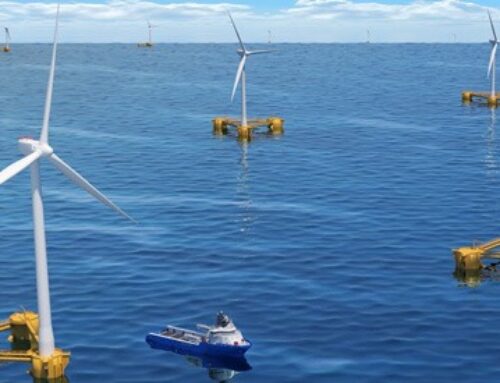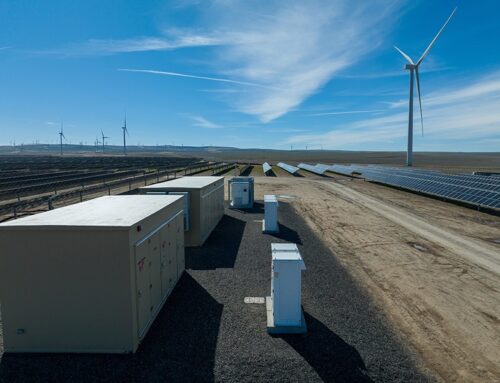Oregon Convention Center is a Global Leader in Sustainability
As one of the most sustainable convention centers in the world, Portland’s LEED® Platinum-certified Oregon Convention Center (OCC) is a leader in environmentally responsible practices. OCC is dedicated not only to minimizing the footprint of its facility, but also to setting an industry standard for sustainability.
Convention venues are large contributors to the U.S. economy. The U.S. Bureau of Labor Statistics reports that the number of conventions and events is expected to expand by 44% from 2010 to 2020 — far outpacing the average projected growth of other industries.
Located in the Lloyd District, an EcoDistrict working to become the most sustainable neighborhood in the country, the OCC has been a LEED-certified building since 2004. It is the only convention center in the U.S. to have earned the U.S. Green Building Council’s Platinum certification for its daily operations. Many green components are built into its daily operations, such as event recycling and composting, water and energy efficiencies, waste diversion, and purchasing local food for catering.
The center has also reached the highest level of the APEX/ASTM certification, the first standards created for green meetings and events. OCC is the only meeting space in the country to receive this honor. This program, verified by the Green Meeting Industry Council, provides a roadmap for planning sustainable events and working with vendors, guests and the regional community.
OCC has focused on innovation in the following areas:
- Enacting energy reduction projects. The OCC’s rooftop solar panels generate approximately 25 percent of the needed electricity onsite. It also has purchased Blue Sky renewable energy from Pacific Power since 2003. As part of a recent remodel, the OCC installed high-tech lighting that senses natural daylight and automatically dims, which dramatically reduces energy use.
“We host the largest solar array in the state that isn’t operated by a utility company. If it was any bigger, we’d have to register as a utility ourselves!” – Ryan Harvey, Oregon Convention Center sustainability manager.
- Diverting materials away from the landfill. The OCC has a goal of reaching an 80% waste diversion rate, which can be achieved if the material brought into the building can be recycled, donated, or taken back by the company that produced it. OCC is achieving this by creating an extensive waste recycling, composting, and food and reusable material donation program. Plus, it has built partnerships with local nonprofit and community assistance organizations, including the Rebuilding Center and SCRAP.
“Convention centers historically have been huge contributors to the local waste stream, but it doesn’t have to be that way. Last year, we donated more than 22 tons of materials to nonprofit organizations, and another 24 tons of edible food.” – Ryan Harvey
- Prioritizing watershed stewardship. A mix of stormwater management and water conservation helps protect Oregon’s rivers and streams. OCC’s rain garden channels storm water from 5.5 acres of its roof and reduces the pollution in that water before it gets to the nearby Willamette River.
- Maintaining excellent indoor air quality. OCC operations prioritize indoor air quality in service to both its guests and employees. The center’s environmentally friendly cleaning policy complements the integrated pest management and the no-idling policy on the loading docks.
- Expanding community engagement. Oregon Convention Center contributes to approximately 6,000 jobs in the Portland region, and attracts an estimated $625 million of economic impact annually. OCC falls under the umbrella of Metro, the unique, regional government in the area. Metro helps plan and coordinate land use and development decisions, protect natural spaces in the area, manage waste and recycling programs, and create policy that protects the health, well-being and happiness of residents.
In 2017, Metro, in partnership with the City of Portland, Prosper Portland and Multnomah County, embarked on the addition of a convention center hotel, the Portland Hyatt Regency, scheduled for completion in 2020. This landmark project has a project team whose work demonstrates a shared commitment to diverse hiring and increased opportunity for people of color. The LEED®-certified hotel will contribute to the Lloyd
District’s emerging identity as a pioneer of new strategies for urban sustainability and transportation.
Prosper Portland’s development of an adjacent office building/parking structure will support the hotel. It will be developed to be the first certified parking structure in the state, meeting Parksmart Gold certification, the highest level of the world’s only certification program that defines, measures and recognizes high-performing, sustainable garages. The ground floor will have 114 spaces for bike parking and at least eight EV charging stations, which aligns with the City of Portland’s Climate Action Plan to support non-car transportation options and reduced carbon emissions.



